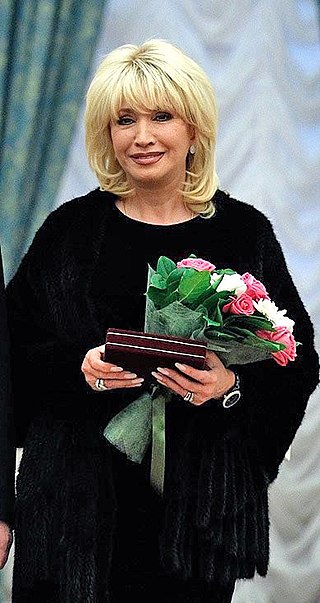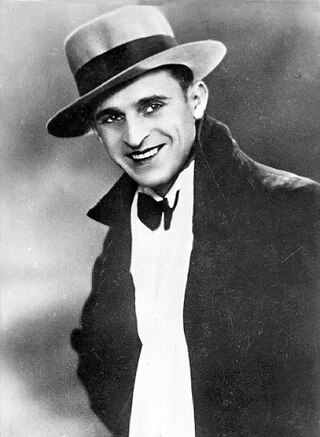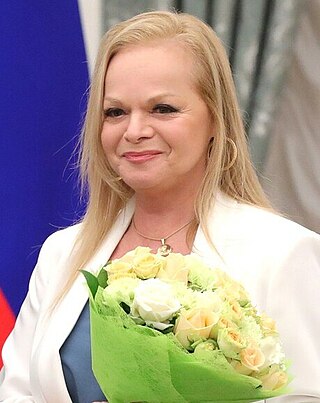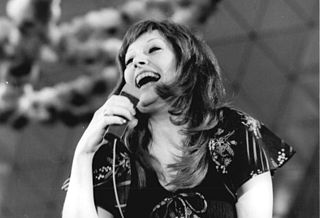Contents
| Sofia Rotaru discography | |
|---|---|
 Rotaru in 2021 | |
| Studio albums | 18 |
The discography of Sofia Rotaru.
| Sofia Rotaru discography | |
|---|---|
 Rotaru in 2021 | |
| Studio albums | 18 |
The discography of Sofia Rotaru.
| Title | Album details |
|---|---|
| Chervona ruta |
|
| Sofiya Rotaru (aka Ballada o skripkakh) |
|
| Sofiya Rotaru II |
|
| Pisni Volodimira Ivasyuka spivae Sofia Rotaru |
|
| Sofiya Rotaru III |
|
| Tolko tebe |
|
| Gde ty, lyubov? |
|
| Nezhnaya melodiya |
|
| Monolog o lyubvi |
|
| Zolotoye serdtse |
|
| Karavan lyubvi |
|
| Khutoryanka |
|
| Lyubi menya |
|
| Ya tebya po-prezhnemu lyublyu |
|
| Nebo – eto ya |
|
| Ya zhe yego lyubila |
|
| Ya – tvoya lybov! |
|
| Ya ne oglyanus |
|
| Year | Title | Peak chart positions | Album | ||||
|---|---|---|---|---|---|---|---|
| CIS [17] | KAZ [18] | MDA [19] | RUS [20] | UKR [21] | |||
| 2003 | "Bely tanets" | 57 | — | — | 69 | 81 | Nebo – eto ya |
| "Belaya zima" | 3 | 56 | — | 4 | 43 | ||
| 2004 | "Bely tanets" (Remix) | 9 | — | — | 4 | 16 | |
| "Tsvetyot malina" (with Nikolay Baskov) | 52 | — | — | 110 | 43 | Ya zhe yego lyubila | |
| "Nebo – eto ya" | 2 | — | — | 38 | 1 | Nebo – eto ya | |
| "Pozovi" | 12 | — | — | 9 | 22 | ||
| "Ty uletish" | 12 | — | — | 17 | 22 | Ya zhe yego lyubila | |
| "Novy god" | 34 | — | — | 41 | 29 | Non-album song | |
| 2005 | "Ne kupish lyubov" (with Valery Meladze, Andrey Danilko and VIA Gra) | 24 | — | — | 125 | 33 | Ya zhe yego lyubila |
| "Ya zhe yego lyubila" | 4 | — | 154 | 3 | 20 | ||
| "Vishnyovy sad" | 124 | — | — | — | 35 | ||
| "Osenniye tsvety" | 5 | — | — | 6 | 2 | ||
| 2006 | "Vyuga" | 52 | — | — | 51 | 33 | Non-album song |
| "Odin na svete" | 6 | — | 156 | 6 | 2 | Ya – tvoya lyubov | |
| "Bylo, no proshlo" (Re-release) | 109 | — | — | 96 | 167 | Zolotoye serdtse | |
| "Lavanda" (Re-release) | 108 | — | — | 107 | — | Lavanda | |
| "Ne lyubi" | 4 | — | — | 6 | 1 | Ya – tvoya lyubov | |
| "Kakaya na sertse pogoda" | 45 | — | — | 75 | 2 | ||
| 2007 | "Serdtse ty moyo" | 2 | — | — | 5 | 1 | |
| "Ya – tvoya lyubov" | 3 | — | 200 | 5 | 1 | ||
| 2008 | "Ya nazovu planetu" | 2 | 151 | 121 | 1 | 1 | |
| "Ne ukhodi" | 1 | — | — | 2 | 5 | ||
| "Tuman" | — | — | — | — | 181 | Ya ne oglyanus | |
| "Oglyanis nazad" | — | — | — | — | 77 | Ya – tvoya lyubov | |
| 2009 | "Ya reshila sama" | 12 | — | — | 14 | 3 | Non-album songs |
| "Nas ne dogonyat" (with Alla Pugacheva) | — | — | — | — | 93 | ||
| "Vremya podozhdyot" | — | — | — | — | 39 | Ya ne oglyanus | |
| 2010 | "Kapelka lyubvi" | 63 | — | — | 59 | — | Non-album song |
| "Ya ne oglyanus" | 23 | — | 152 | 26 | 7 | Ya ne oglyanus | |
| 2011 | "Vremya lyubit" | 106 | — | — | 187 | 10 | Non-album songs |
| "Vremya lyubit" (Remix) (featuring Pyotr Dranga) | 17 | — | — | 16 | — | ||
| "Luna luna" (Re-release) | — | — | — | — | 169 | ||
| "Tolko etogo malo" (Re-release) | — | — | — | — | 146 | Zolotoye serdtse | |
| 2012 | "My budem vmeste" | 43 | — | — | 43 | 66 | Non-album songs |
| "Dva solntsa" | 119 | — | — | — | 93 | ||
| "Ya naydu svoyu lyubov" (with Nikolay Baskov) | 113 | — | — | 125 | — | ||
| 2013 | "Tri dnya" | 64 | — | — | 61 | — | |
| "Prosti" | 85 | — | — | 169 | 17 | ||
| "Ty samy luchshy" | 64 | — | — | 155 | 2 | ||
| 2014 | "Moya lyubov" | 120 | — | — | — | 6 | |
| "Davay ustroim leto" | 76 | — | — | 71 | 74 | ||
| 2016 | "Skolko by zima ni mela" | 47 | — | — | 47 | — | |
| 2017 | "Na semi vetrakh" | 169 | — | — | 160 | — | |
| 2019 | "Muzyka moyey lyubvi" | 180 | — | — | 142 | — | |
| "—" denotes items which were not released in that country or failed to chart. | |||||||

Sofiia Mykhailivna Yevdokymenko-Rotaru, known simply as Sofia Rotaru, is a Ukrainian pop singer of Romanian origin.

Irina Aleksandrovna Allegrova is a Russian singer. She is a People's Artist of Russia (2010).

Alla Borisovna Pugacheva is a Russian singer and songwriter, actress. Her career began in 1965 and continues to this day, although she retired from performing in 2010 after the international concert tour "Dreams of Love". For her "clear mezzo-soprano and a full display of sincere emotions", she enjoys an iconic status across the former Soviet Union as the most successful Soviet performer in terms of record sales and popularity. For several decades, Pugacheva was a sex symbol, a style icon, an inspiration for Soviet women and a heroine of Russian tabloids. In the media, Pugacheva has been called "the Queen of Russian pop music". Pugacheva is one of the few Russian performers who has achieved international success, along with Anna Netrebko and t.A.T.u.

Anna Wiktoria German-Tucholska was a Polish singer (lirico-spinto), immensely popular in Poland and in the Soviet Union in the 1960s–1970s. She released over a dozen music albums with songs in Polish, as well as several albums with Russian repertoire. Throughout her music career, she also recorded songs in the German, Italian, Spanish, English, and Latin languages.

Pyotr Konstantinovich Leshchenko, a singer in the Russian Empire, and later Romania, is universally considered "the King of Russian Tango" and specifically known for his rendition of "Serdtse"—a tango, sung unusually not in Spanish but in Russian.

Tatyana Ivanovna Rudneva is a Russian singer recognized for her strong, melancholic romance ballads, catchy electro-pop beats and techno remixes. She shot to fame in 1990 when she started her singing career with the band Letniy sad. Tatyana and Letniy sad had 10 hit albums together between 1990 and 1996. Since 1996, she has maintained her popularity and released a further 18 hit solo albums. She was named a Meritorious Artist of Russia (2004).

Russian singer Tatiana Bulanova has released twenty-five studio albums, ten compilation album, one video album, one hundred and three singles, and forty-five music videos.
Pop music in Ukraine is Western influenced pop music in its various forms that has been growing in popularity in Ukraine since the 1960s.

Edita Stanislavovna Piekha is a Soviet and Russian singer and actress of Polish descent. The peak of its popularity in the countries of the former USSR was in the 1960s. Her most famous song is “Our Neighbor”. She was given the title Honorary Citizen of St. Petersburg.

Larisa Aleksandrovna Dolina is a Russian jazz and pop singer and actress. She was awarded the Order of Honour in 2005.
Monologue of Love is a Soviet musical telefilm, written by Grigore Vieru and directed by Larisa Maslyuk, starring Sofia Rotaru in the main role. The movie filmed at Ukretelefilm in Crimea, Kazakh SSR and Lithuanian SSR, features the new conception in the Soviet musical telefilms: substantial poetry monologues recited by Sofia Rotaru on themes associated with love, followed by thematic songs and corresponding natural geographical and theatrical scenic setting.

Ya – tvoya lybov'! - is a 2008 studio album of Sofia Rotaru, recorded at Artur-Music in Ukraine. The album was released on 9 June 2008 in Ukraine with 11 tracks. The album includes eight earlier unreleased, but aired in charts songs, one remastered song and two new songs, never aired before the release of the album: Mozart, Look Behind and Don't Walk Away.

Sofia Rotaru and Chervona Ruta is a 1981 studio album by Sofia Rotaru, recorded at Melodiya in the USSR. It is packaged together with Where Has Love Gone?, the film soundtrack for Where Has Love Gone?.

Sofia Rotaru poёt pesni Vladimira Ivasyuka is a studio album of Sofia Rotaru, recorded at Melodiya in the USSR in 1978. Sofia Rotaru was awarded the grand prix of the Central Committee of Komsomol for this album, which became the reference in Ukrainian pop culture. Russian title: Sofia Rotaru poёt pesni Vladimira Ivasyuka Ukrainian title: Pisni Volodimira Ivasyuka spivae Sofia Rotaru

Yekaterina Nikolayevna Chuprinina, better known by her stage name Katya Lel, is a Russian pop singer.
"Kray, miy ridniy kray" is a song originally recorded by Sofia Rotaru for her 1981 album Sofia Rotaru and Chervona Ruta.

The discography of the Soviet and Russian singer Alla Pugacheva includes 100 records, compact cassettes, CDs and DVDs, including 17 studio albums, 3 live albums, 33 compilations and 42 singles. In total, she has sold more than 250 million records. Her debut album “Mirror of the Soul” sold 10 million copies, and the single “Harlequin” sold 14 million copies; her other albums and singles were also successful.

Russkiye pesni, subtitled Syuita na temy narodnykh pesen, is a studio album by Russian singer-songwriter Alexander Gradsky released in 1980 through Melodiya. It was the first full-length rock record officially released in the Soviet Union. The album is a conceptual one and consists of Russian folk songs in a modern rock treatment.

The discography of Russian singer and composer Alexander Gradsky includes fifteen studio albums, three live albums, six soundtrack albums, six compilations, one video album and four singles.

Krysha doma tvoyego is the second studio album by Russian singer-songwriter Yuri Antonov released in 1983 through Melodiya.